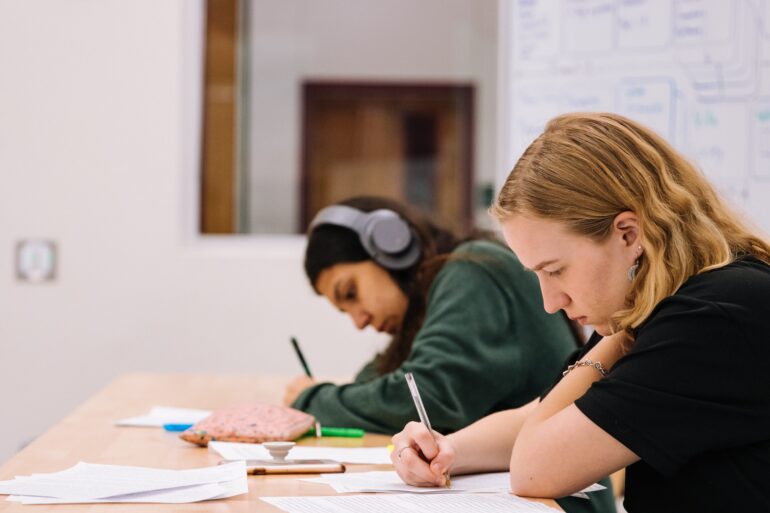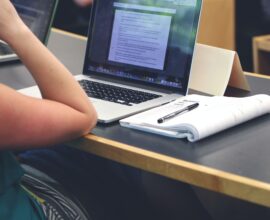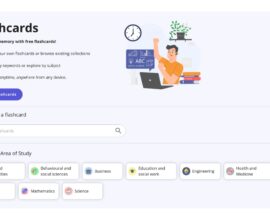Beat Exam Stress With These Simple Tips
Exams are an important part of your academic journey, and it’s perfectly normal if you’re feeling overwhelmed or anxious before the big day, or struggle to find the motivation to study hard for exams. Pre-test nerves are a common part of the university experience, and pretty much everybody experiences them at one point or another.
If you’re feeling apprehensive about your exams coming up and feeling worried about the test, you might want to consider some effective techniques for managing those feelings.
Some of them are aimed at those who need relief from exam nerves now or need to find the motivation to get ready and feel confident taking the test. Others are more concerned with long-term habit building. You might as well form some good habits now so you’re in even better shape, with even more motivation, by the next exam, and take your studying game to the next level.
We’ve sorted the below list into short-term and long-term habits to try, based on what you need:
Technique Breakdown: Short Term Tips
1. Plan & Prepare Your Study Routine Early
Everybody wants to be someone who feels motivated to study. Planning ahead can help with this.
Starting your exam prep early is key to improving your marks and reducing exam stress. It can be tempting to procrastinate, but studies show that students who set aside time earlier than others tend to perform better under exam conditions. Planning can help you find some study motivation because you know what you have to get done.
Early preparation means working out your study timetable a few weeks, or even months, before the exam. Make your plans before you need them and you’ll remove the stress and frustration that comes with cramming.
Planning ahead also means you can break your study down into smaller chunks, so you’ll have more free time available.
2. Create a Designated Study Space
You cook in the kitchen. You sleep in your bedroom. It makes sense to study in a separate study area. . Creating a dedicated space (away from distractions and other daily activities) has been shown to improve academic performance.
Our brains like to make things as efficient as possible. That means they make neurological “shortcuts”, allowing more brain space for other things. The brains of young adults are particularly prone to this. Creating a dedicated study area and using it will ensure that your mind unconsciously associates that space with study time. This will help you focus, and make your study periods more efficient and effective, and help keep you on task.
A more immediate benefit of using a dedicated study area, particularly if you are easily distracted, is that you can eliminate distractions. If it’s a separate room in your house, make sure to leave your phone in another room.
Ensure that your space has a comfy chair, plenty of room and natural light for you to study..
3. Practice Papers During Your Study Session
This tip may work better for those in STEM fields than in the humanities, but the principle is worth considering.
Exams take place under very different conditions than you would encounter in everyday life. You’re in a quiet room, answering question after question as best you can, surrounded by other students. The exam itself is nothing like your classroom. You can prep for popular exams using resources online.
That’s why practice papers are so important. You can reduce your exam anxiety by exposing yourself to similar exam conditions before you take the real test itself. You won’t be in a totally unfamiliar, intimidating environment, and you’ll be better able to focus during the test.
You can also use practice exams or test revision apps like Zookal Test Prep to help get into the exam mindset. You can also track your progress and learnings as you go!
4. Mark Your Practice Papers
Key to this is marking your practice tests! When you finish your test, mark the exam by using the answers at the back or online solutions, and make sure to take note of any questions you got wrong. This highlights the areas that you need to work on, and in your next study session you can go over this again in more detail.
5. Set SMART Goals to Stay Motivated
Setting goals for your study is a major aspect of your planning stage. The SMART system is a great way to get started doing this. The SMART acronym stands for:
- Specific
- Measurable
- Achievable
- Relevant
- Time-bound
“I want to get better marks” is not a SMART goal. “I will finish three practice papers before the exam” is. Set immediate, tangible goals using the SMART technique to pursue your academic or study goals.
6. Taking Breaks Improves Study Motivation
You should be taking frequent, short breaks when you’re studying. This is a fundamental tenet of the Pomodoro technique, as well as many study guides. Studies show that short frequent breaks can break your study session into manageable chunks, and help you stay focused over a long period of time. Be purposeful when you take your breaks and structure your study time accordingly.
7. Use Your Breaks Wisely
Don’t lapse into a mindless activity when taking a break. Get some fresh air, go for a walk, and leave your study area. Taking a walk might help you feel creative and develop more ideas when you’re working through a problem, or allow you to come back to your homework with a fresh pair of eyes.
Think about it like this: you could do hours of compromised study, or break it up and feel motivated and focused by taking small breaks at regular intervals, turning the larger task into small, more manageable chunks.
You can always take a longer break if you start to feel tired. This will help you de-stress and allow you to return to your studies when you’re feeling more refreshed.
8. Use Your Learning Style
Generally, there are four major types of learners:
- Visual
- Auditory
- Reading & Writing
- Kinesthetic
Visual learners learn best with diagrams, charts, and visual aids such as a mind map. Auditory learners can hear things and understand them with immediate clarity. Readers and writers tend to learn best by writing things down or reading them, like in an instruction manual or literature review. Kinesthetic learners learn best by doing important tasks themselves.
9. How To Use Your Learning Style
Depending on your learning style, you can optimise your study habits. Visual learner? Make yourself some diagrams and flow charts. If you’re an auditory learner, talking to fellow students in a study group, at the coffee shop, or getting study help from an expert tutor in conversation is a great way to consolidate your knowledge. If reading is your thing, be sure to take comprehensive, legible notes. Kinesthetic learners will thrive when taking practice papers.
Technique Breakdown: Long Term Tips
These tips below are built around longer-term habits. There’s an old Chinese proverb that says “A journey of a thousand miles begins with a single step”, and you can start your long term study habits today.
1. Eat Healthy
Studies show that eating right will improve your marks. Students with a balanced diet feel better overall, and improved marks are a huge part of that. Students, particularly young adults, , without enough iron and Vitamin B in their diet often report dizziness, brain fog, and impacted short term memory recall. .
Make sure to eat plenty of fresh fruit and vegetables, grains, and clean proteins. You don’t need to throw away your sweet treats, but they shouldn’t make up the bulk of your diet.
2. Get Quality Sleep
The results are in. More sleep improves your grades.
When you go to sleep, the brain goes to work, and getting consistently good sleep will noticeably improve your memory, cognition, and overall mood. Getting consistent, quality sleep is also helpful for reducing your overall anxiety and stress levels.
3. How To Improve Sleep
Improved sleeping habits reduce anxiety and will help you to stay motivated. This takes some self control, but to improve your sleep, you can try:
- Avoid hanging out in bed during the day.
- Dim the lights an hour or two before bed.
- Turn your tech off an hour or two before you go to bed (as the blue light can keep you awake).
- Go to bed at the same time every night.
- Have the same bedtime routine every night.
4. Study at the Same Time Every Day
Just like sleeping and eating, you should start studying at the same time every day.
Studies show that studying at the same time every day conditions your brain to be in the optimal frame of mind for study when it’s time to do so. Body chronology is also a factor in this, as you will be more alert and focused at a particular time of day.
5. The Best Time To Study
For most young adults, this is between 10am and 2pm, and then from 4pm to 10pm. Your own body clock might differ, so take note of when you feel like you’re in “acquisition mode” and make sure to study at that time every day, whether you’re taking notes, doing practice papers, or using an online study app.
Conclusion
Overall, the best thing to do is find a study plan that works for you! There are plenty of resources you can use, such as online homework help, and on-campus resources to direct and assist in your study planning.
Whatever your plan is, be sure to make it in advance, set some goals, and start a study routine that fits into your life. A great studying environment is a wonderful place to start. Having a good daily routine will help with your exam confidence and reduce stress. Similarly, making a few small lifestyle changes like sleep and eating are great for reducing anxiety and stress.






